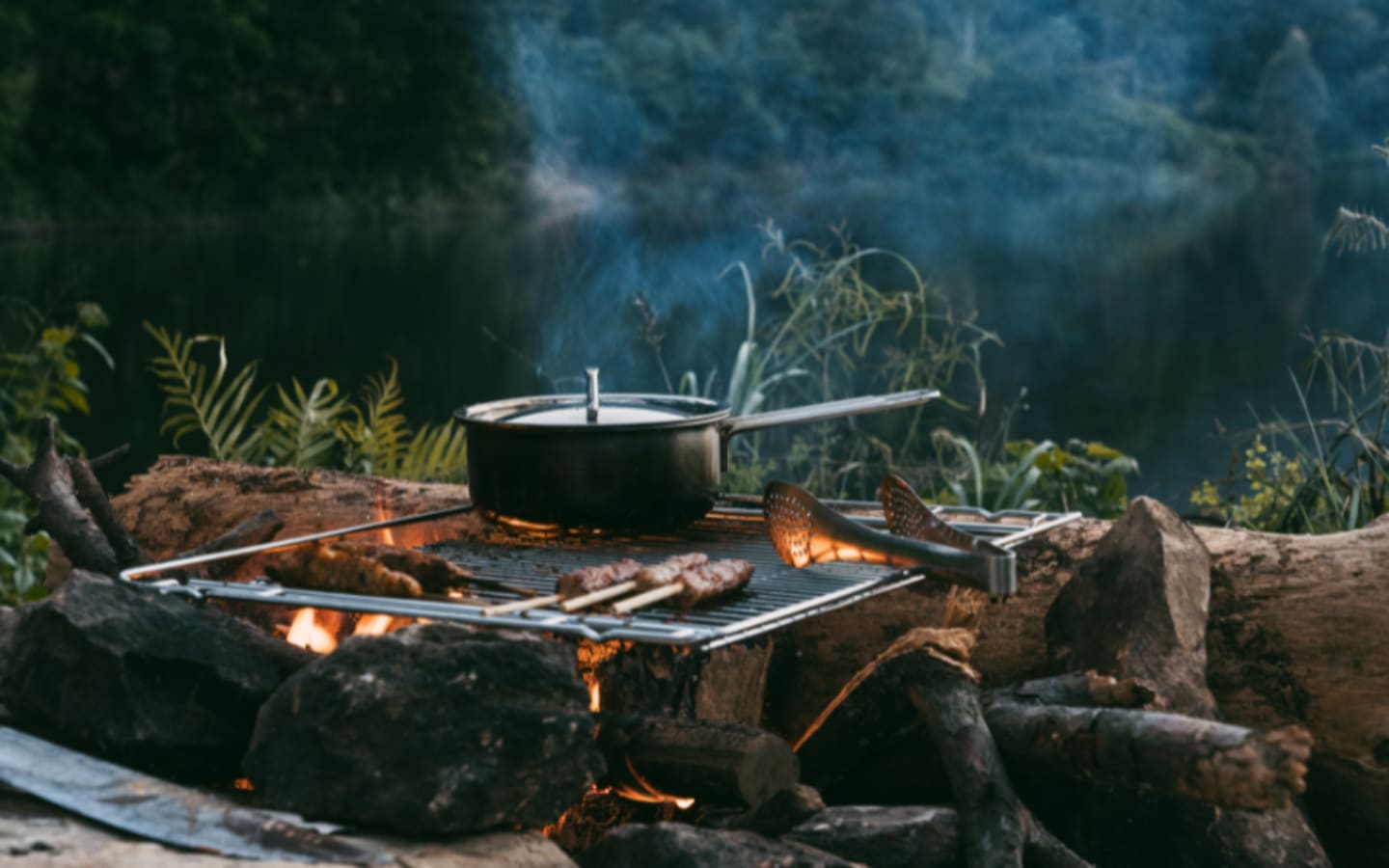Heading out for a camping or overlanding trip is all about kicking back, soaking in nature, and maybe roasting a marshmallow or two. But let’s be real—none of that vibes if you’re stuck eating soggy sandwiches or realize you forgot the salt three days in. Prepping your food right can make or break your adventure. Here’s a no-nonsense guide to getting your grub ready for the great outdoors, with some tips I’ve picked up from my own trips.
1. Plan Your Meals Like a Boss
First things first, figure out what you’re eating. Sit down with a pen and paper (or your phone, whatever) and map out every meal—breakfast, lunch, dinner, and snacks. Think about how many days you’re staying and who’s coming along. Are you feeding just yourself or a whole crew? Keep it simple: stuff like oatmeal for breakfast, PB&J for lunch, and a hearty chili for dinner works like a charm. Pro tip: plan one extra meal in case you get stuck out there longer than expected—I learned that the hard way when a flat tire turned my weekend into a three-day saga.
2. Go for Non-Perishables When You Can
Fresh food’s great, but it ain’t always practical. Stock up on non-perishable goodies like canned beans, tuna, dried fruits, nuts, and jerky. These bad boys don’t need a fridge and can handle a bumpy ride in your rig. Mix in some instant rice or pasta, and you’ve got yourself a solid base for meals. They’re lightweight, too, which is clutch if you’re hauling gear overland.
3. Pre-Cook What You Can
Nobody wants to spend an hour chopping onions at a campsite when the bugs are out to get you. Pre-cook stuff at home to save time and hassle. Think grilled chicken strips, taco meat, or even a big batch of spaghetti sauce. Toss it in resealable bags or containers, and you’re golden. I once pre-made some sloppy joe mix, froze it, and it doubled as an ice pack in my cooler—total win.
4. Pack a Cooler Like a Pro
If you’re bringing perishables—meat, cheese, eggs, whatever—your cooler’s your best bud. Freeze anything you can beforehand, like burger patties or that pre-cooked chicken. Layer it smart: ice on the bottom, then your frozen stuff, then anything that just needs to stay cool, like veggies or butter. Top it off with more ice. Oh, and keep it out of the sun—trust me, I’ve had melty cheese regrets.
5. Spice It Up (But Keep It Simple)
Food doesn’t have to be bland just ‘cause you’re roughing it. Pack some salt, pepper, garlic powder, and maybe a little hot sauce if you’re feeling spicy. I keep mine in a tiny ziplock so it doesn’t spill all over my gear. You don’t need a whole pantry—just enough to make your meals pop.
6. Portion It Out
Overpacking food is a rookie move. Measure out what you’ll actually eat so you’re not lugging extra weight or dealing with leftovers in the middle of nowhere. Single-serve packets of oatmeal or pre-cut veggies are your friends. Last summer, I brought way too much pasta and ended up feeding the raccoons—lesson learned.
7. Don’t Sleep on Snacks
You’re gonna get the munchies out there, guaranteed. Trail mix, granola bars, and chips are easy to stash and grab when you’re hiking or just chilling by the fire. I always toss in some chocolate—it’s my go-to reward after setting up camp.
8. Gear Up Right
Good food prep needs good tools. A sturdy cooler, some reusable containers, and a decent camp stove are must-haves. I swear by my little propane burner—it’s saved me from eating cold beans more times than I can count. Bring a sharp knife, a cutting board, and a couple utensils, too. Keep it light, but don’t skimp on the essentials.
9. Stay Clean and Green
Trash is a buzzkill in the wild. Pack out what you pack in—foil, wrappers, all of it. I like to bring a small trash bag just for food scraps so I’m not stinking up my campsite. Bonus points if you wash dishes with biodegradable soap to keep Mother Nature happy.
Countries with Poor Water and Food Sanitation
If you’re overlanding or camping in places where the water’s sketchy and food safety’s a gamble, you gotta step up your prep game. Some countries—like parts of India, Haiti, or certain spots in sub-Saharan Africa—don’t always have the cleanest H2O or the safest street eats. I’m not saying don’t go; just don’t trust the tap or that random roadside taco unless you’re ready to risk a week on the toilet.
First off, bring a water purifier or some purification tablets. I’ve got this little filter straw thing that’s saved my butt in places where the river looked more like chocolate milk than drinking water. Boil it if you can, too—better safe than sorry. For food, stick to stuff you can peel yourself, like bananas or oranges, or cook it hot enough to kill whatever’s lurking. Pre-packaged grub’s your safest bet when the local sanitation’s dodgy. I once ate some mystery meat in a market abroad and spent the next day hugging a bush—never again, man.
Best Practices When Stocking Up in Foreign Countries
Stocking up for camping or overlanding in a foreign country can feel like a treasure hunt—except sometimes the treasure’s expired or labeled in a language you can’t read. Whether you’re grabbing supplies in a bustling market or a tiny village shop, a few smart moves can keep your food game strong.
First, scope out what’s local and fresh—stuff like bread, rice, or fruits can be gold if they’re in good shape. But eyeball it hard; if it looks funky or the flies are having a party, skip it. I once snagged some mangoes in Mexico that were cheap and juicy—total score—but passed on some sketchy-looking meat that smelled like trouble. Stick to sealed packages when you can, like canned goods or bagged snacks, ‘cause they’re less likely to let you down.
Language barriers can trip you up, so have your phone ready with a translation app—or just point and smile like I did in Thailand when I accidentally bought chili powder instead of salt. Check expiration dates if they’re there, and don’t be shy about asking locals what’s good—they usually know the deal. Oh, and haggle a bit if it’s a market; it’s half the fun and might save you a buck. Load up on water bottles or a big jug if the tap’s a no-go, and you’ll be set to roll without stressing.
Emergencies
Stuff hits the fan sometimes, right? Flat tires, storms, or getting lost can turn your chill camping trip into a survival episode. Food prep can be your lifeline when emergencies strike. Always stash some extra non-perishable goodies—like energy bars, dried fruit, or those little tuna packets—in your gear. They don’t weigh much, but they’ll keep you going if you’re stuck waiting for help.
I had a scare once when a freak rainstorm flooded my usual route out. Cooler got swamped, and my fresh food was toast. Lucky for me, I’d tossed in some extra granola bars and a can of soup—kept me fed ‘til I could bounce. Also, keep a small emergency stove and fuel handy. If your main setup fails, you can still heat up something warm to keep your spirits up. Oh, and pack a lil’ first-aid kit with your food stuff—band-aids and snacks go together like peanut butter and jelly in a pinch.
Final Thoughts
Prepping food for camping or overlanding doesn’t have to be a chore. Keep it simple, plan ahead, and roll with what works for you. Whether you’re frying up some bacon at sunrise or scarfing down a quick trail mix handful, good eats make the trip way sweeter. So, next time you hit the road or the woods, you’ll be ready to chow down like a champ. Happy trails!





